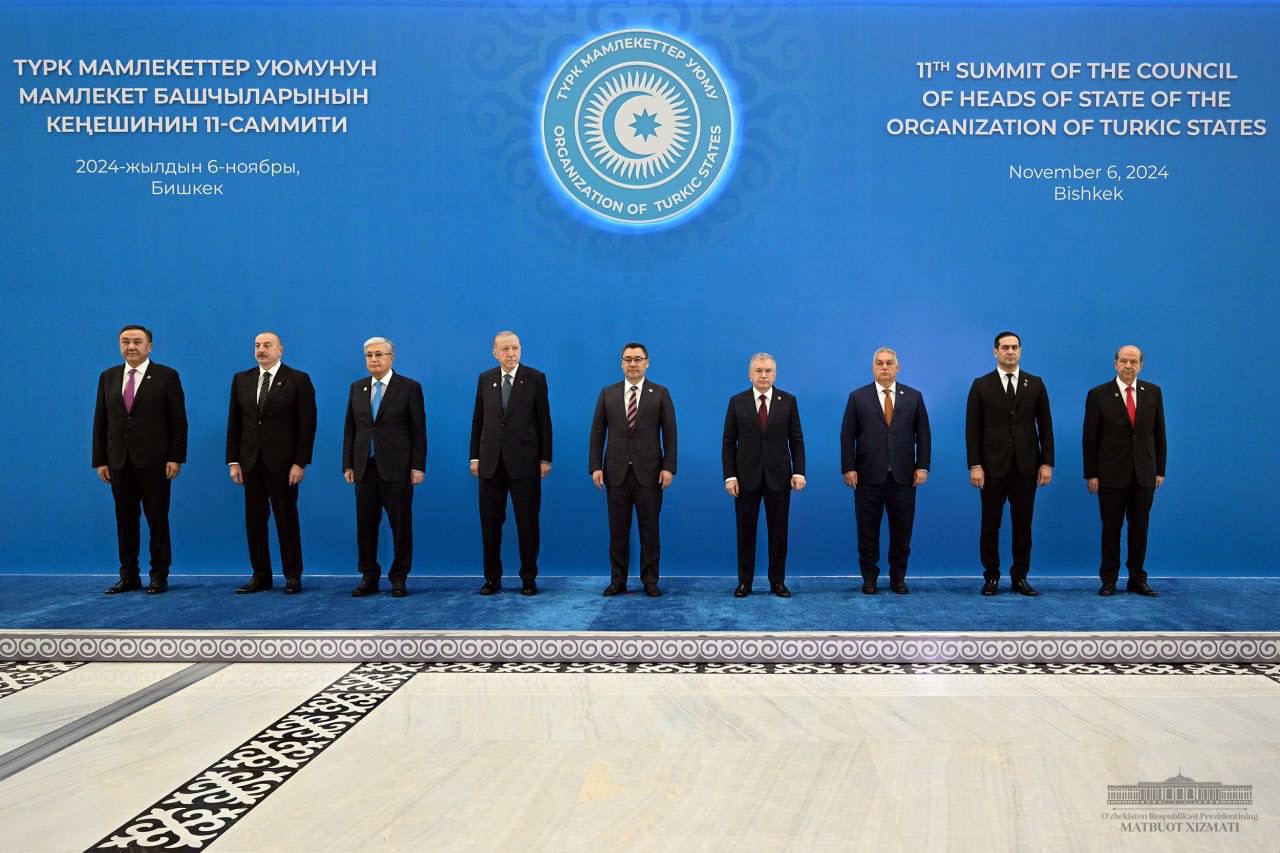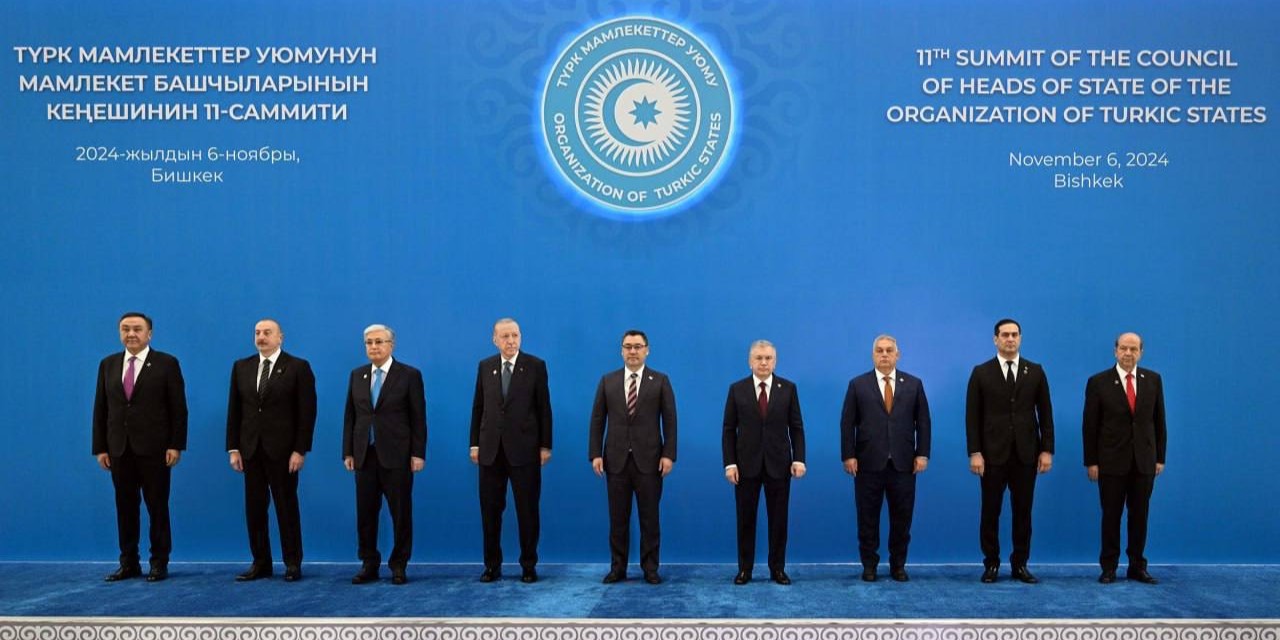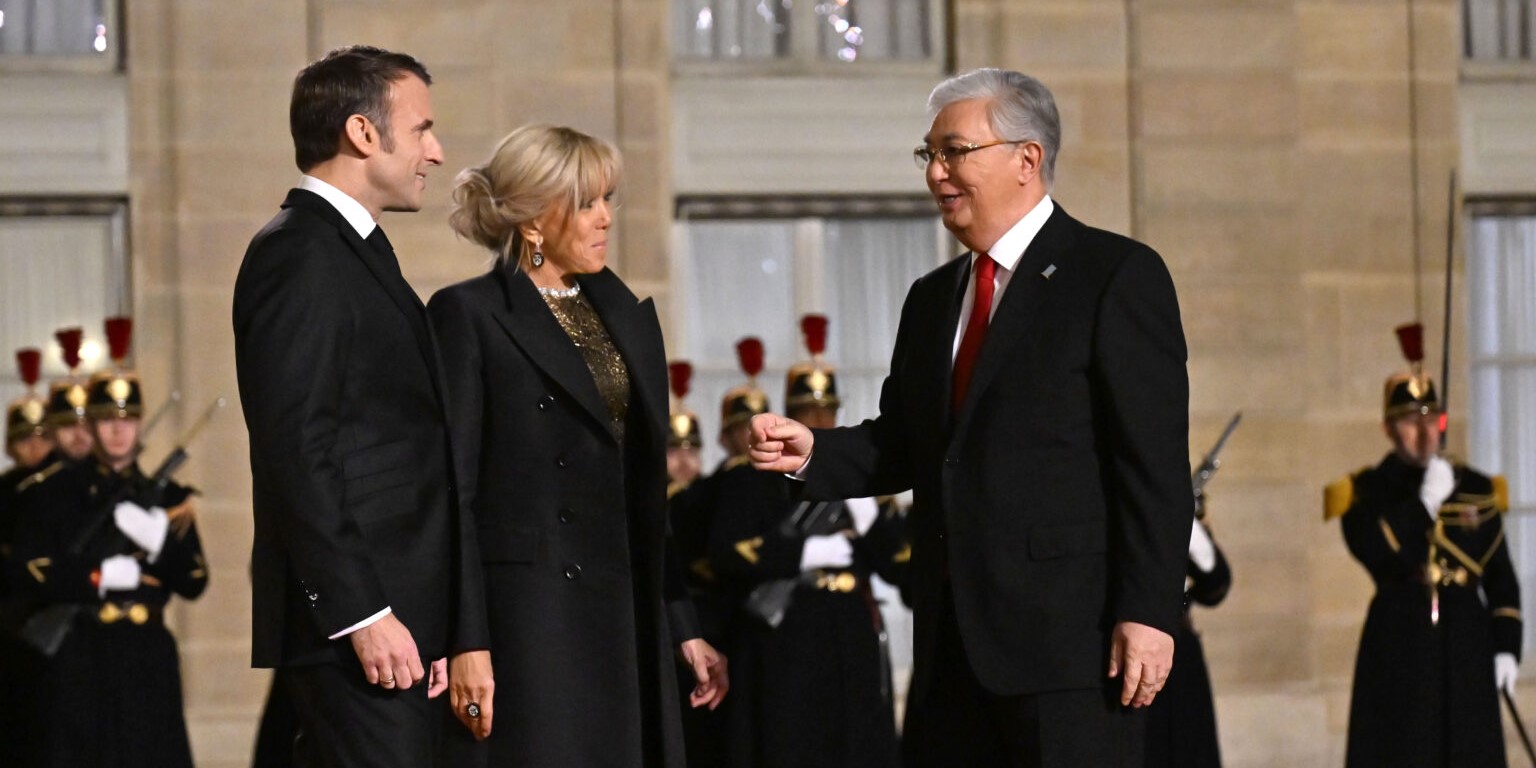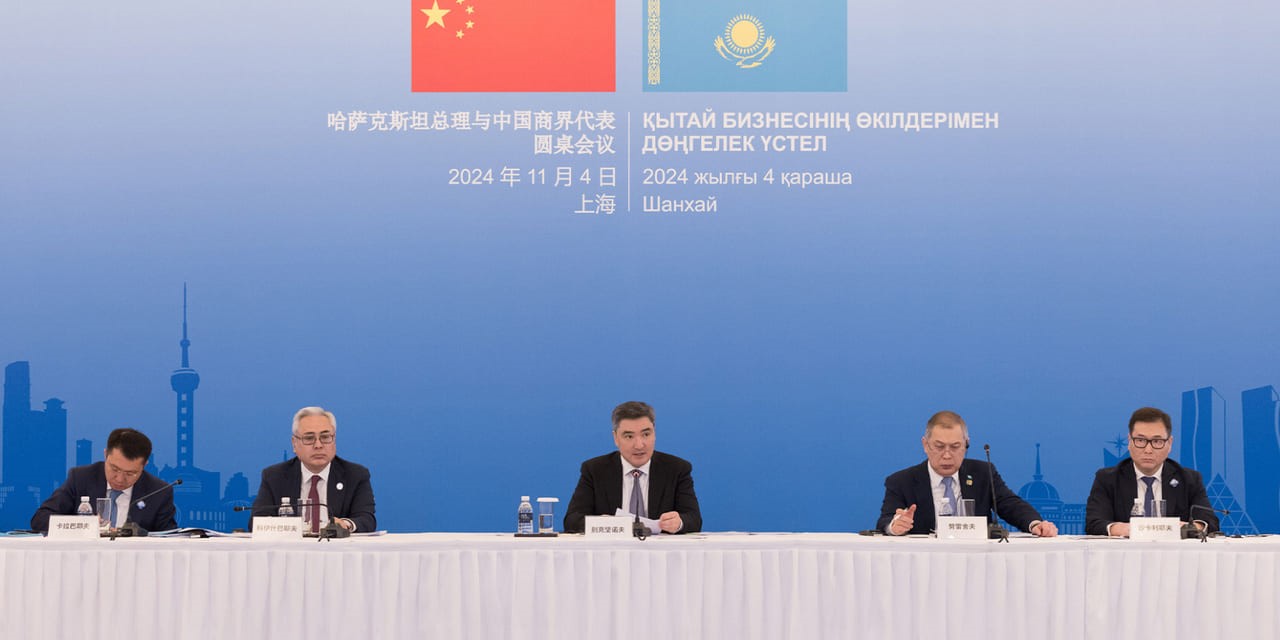Over the past week, the media in the region has focused on several critical diplomatic events, such as the 11th Organization of Turkic States (OTS) summit in Bishkek, Tajikistani President Emomali Rahmon’s visit to Kuwait, and Kazakhstani President Tokayev’s state visit to France. Several outlets noted the Kazakhstani trade mission to China under Prime Minister Olzhas Bektenov. Others reported on Kyrgyzstan’s plans to issue new mining licenses and reopen its mining sector. Multiple sources discussed the 23rd CAREC Ministerial Conference and the 17th Republic of Korea – Central Asia Cooperation Forum. The media also concentrated on the EU’s pledge of $100 million in aid to Afghanistan.

The 11th summit of the Organization of Turkic States (OTS) was held in Bishkek. Source: Daryo
Diplomatic Events
Leaders from across the region attended the 11th summit of the Organization of Turkic States (OTS) in Bishkek (Daryo). At the summit, the leaders signed the Resolution on the Green Vision of the Turkic World, enhancing regional cooperation on protecting the environment and the green energy transition. The Charter of the Turkish World was also formally adopted, outlining the values and goals of the organization. Overall, the leaders attending the summit emphasized the importance of unity and collaboration within the Turkish world to address the world’s pressing challenges. The heads of the Central Banks of the five permanent members also signed a memorandum of understanding to establish the OTS Council of Central Banks (Kun). The new council will facilitate knowledge exchange regarding payment systems and other financial technology and effective monetary policy coordination across member states, ensuring the region's economic stability.

The 11th summit of the Organization of Turkic States (OTS) was held in Bishkek. Source: Daryo
Tajikistani President Emomali Rahmon paid an official visit to Kuwait on November 3 (The Times of Central Asia). He met with the country’s leaders and concluded several agreements to strengthen relations between the two countries. They signed a memorandum of cooperation between the Foreign Ministries of Tajikistan and Kuwait’s Diplomatic Academy, a protocol to amend the double taxation agreement between the two countries, a memorandum on labor regulation in the private sector, several agreements on trade and industrial cooperation, and a tourism program for 2024-2026, among others. Rahmon also thanked Kuwait’s Development Fund for its generous support of road, irrigation, and energy projects in Tajikistan. He also met with the head of the Kuwait Fund for Arab Economic Development (KFAED), Walled Shamlan Al-Bahar, to discuss financing future projects in Tajikistan (Asia Plus). He also thanked them for providing $100 million towards the completion of the Rogun dam.
Kazakhstani President Kassym-Jomart Tokayev paid a state visit to France from November 4-5 (Tengri News). During the visit, President Tokayev visited the Guimet National Museum of Asian Arts in Paris and the Kazakhstan: Treasures of the Great Steppe exhibition (The Astana Times). A state reception in his honor was also held at the Elysee Palace. The 13th France-Kazakhstan Business Council took place. In total, 24 documents worth around $2 billion on cooperation were signed (Kazinform). Particular attention was paid to the expertise of several French companies in the nuclear and mining sectors. Gabidulla Osspankulov, chairman of the Investment Committee of the Kazakh Foreign Ministry, noted that the company Orano has a great deal of experience in uranium extraction and that EDF is the world’s largest operator of nuclear reactors. He also stated that their participation in the consortium to construct Kazakhstan’s first NPP would be discussed during the visit.

Kazakhstani President Kassym-Jomart Tokayev arrives at the Elysee Palace at the beginning of his state visit to France. Source: Astana Times
On November 4, Kazakhstani Foreign Minister Murat Nurtleu made an official visit to the Republic of Korea (The Astana Times). South Korea is Kazakhstan’s fifth largest investor, with bilateral trade totaling $6 billion in 2023. In a meeting with his South Korean counterpart, he noted that South Korea is one of Kazakhstan’s most reliable partners in Asia. They discussed existing initiatives, such as the Astana Hub IT Park, and signed a cooperation action plan for 2025-2027. He also attended the 17th Republic of Korea – Central Asia Cooperation Forum (Kazinform). The participants discussed key areas of cooperation, including transport, energy, digitalization, and environmental issues. Foreign Minister Nurtleu invited South Korean companies to participate in developing the Trans-Caspian Transport Route and Kazakhstan’s mining sector. He also emphasized the importance of collaboration in AI and the green transition. Overall, the forum helped lay the groundwork for next year's upcoming Central Asia-Republic of Korea summit.
Infrastructure
On November 7, Uzbekistani President Shavkat Mirziyoyev attended a video conference on improving efficiency in water and energy use (AKIpress). Uzbekistan has adopted several new water-saving measures. They have concreted 550 kilometers of canals and irrigation ditches, and increased the water supply on 200,000 hectares, saving 450 million cubic meters of water annually. Farmers have also concreted 13,500 kilometers of their internal networks. A water metering system has been introduced in several districts, which has doubled the water supply to the fields this year. Despite a 10-15% reduction in water losses due to canal concreting, losses remain significant in 20 districts. Therefore, it was decided that 18,000 kilometers of main and 94,000 kilometers of internal canals should be concreted. In total, 800 billion Soms will be allocated for this work next year. Since concreting accelerates the flow of the river, they plan to build 2,000 micro-hydroelectric power plants, which will generate an additional 600 million kW of electricity annually. In recent years, water-saving technologies have been implemented on an area of 2 million hectares, saving 2 billion cubic meters of water last year in total.
Investment
This week, the Kazakhstan Global Investment Roundtable occurred in Astana (Kazinform). The event brings together state bodies and international investors to address issues pertaining to Kazakhstan’s business climate and investment strategies. On the sidelines of the roundtable, the region of West Kazakhstan and Hyundai Solar KZ777 signed a memorandum of understanding. The company plans to invest 81 billion tenge in four regional projects, creating 120 new jobs. The projects include a new waste treatment plant and a solar panel factory.
Over the past sixteen years, China has overtaken Russia as the leading investor in Tajikistan (Daryo). Since China and Tajikistan concluded their Treaty on Good-Neighbourliness, Friendship, and Cooperation, China invested $3.85 billion in Tajikistan compared to Russia’s $1.85 billion, according to Tajikistan’s State Committee for Investments and State Property Management. Chinese investments increased dramatically in 2011 after the resolution of several territorial disputes. However, investments declined during COVID-19 before rebounding strongly in 2022. Other countries such as Kazakhstan provided $1.21 billion, the United States $808 million, and the United Kingdom $805 million.
Kazakhstani Prime Minister Olzhas Bektenov led a trade delegation to China this week (The Astana Times). The delegation aimed to fulfill Presidents Tokayev and Xi’s pledge to double bilateral trade from the record $41 billion reached last year. Earlier this week, it was also reported that bilateral trade amounted to $33 billion so far this year (Kazinform). On November 4, Bektenov participated in an investment roundtable with several leading Chinese companies. During the visit, Prime Minister Bektenov signed eight commercial agreements worth $2.5 billion with Chinese companies. The agreements include Samruk-Kazyna Invest, QAZAQGAZ AIMAQ, and Goldcard Smart Group committing to an $8 million project for the local assembly of gas meters in Almaty’s Alatau SEZ PIT, Qarmet and Zhengzhou Coal Mining Machinery Group investing $70 million to supply mechanized equipment for Kazakh coal mines, Xinxing Ductile Iron Pipes investing $161 million in building a cast iron pipe plant in Kazakhstan to support local infrastructure projects, China Metallurgical Group Corporation agreeing to invest $1 billion in mining and metallurgy, and Sinotruk International and Saran Machinery signed a $70 million agreement to establish truck and special equipment manufacturing, creating approximately 1,000 jobs (Daryo). During his visit, he met with the Premier of the State Council of China, Li Qiang, and attended the 7th China International Import Expo (KazTAG).

Kazakhstani Prime Minister Olzhas Bektenov led a trade delegation to China. Source: Daryo
On November 8, the 23rd Ministerial Conference of the Central Asia Regional Economic Cooperation (CAREC) Program was held in Astana (UZ Daily). The conference discussed several initiatives, including the "CAREC Climate Change Action Plan," "CAREC 2030 Midterm Review," as well as discussions on "Decarbonisation and Regional Energy Security," "Innovative Climate Solutions and AI’s Role," "Development of CAREC Corridor 2," and the "CAREC Institute Activation Plan." In recent years, Kazakhstan has received $9 billion through CAREC investments, with Central Asia receiving around $51 billion (The Astana Times). Uzbekistan has received $19 billion, and over the next five years, Uzbekistan plans to implement around 41 new projects totaling $12.6 billion (Daryo). The conference also witnessed the signing of several documents related to green energy and infrastructure development. Various projects outlined for 2025-2026 include digitalization, barrier-free e-commerce, and energy.
Critical Raw Materials
Kyrgyzstan plans to expand its mining sector by issuing new licenses (The Times of Central Asia). The move, unthinkable a few years ago, comes as the global economy faces a shortage of critical raw materials. In 2019, a moratorium was placed on uranium and thorium mining after a series of controversies, including the development of the Kyzyl-Ompol uranium mine and the Kumtor cyanide spill in 1998. However, the Kyrgyzstani government is looking to exploit their country's mineral resources in response to growing global demand and the need to reform the national economy. In 2023, the ban on uranium mining was lifted and various regulations were changed to attract international investors. Nevertheless, concern about the negative impact of mining on the environment remains. Earlier this year, a truck carrying radioactive waste overturned, and a Chinese company was reported to have destroyed part of a glacier (Daryo).
Logistics
China has recommenced rail freight services with Afghanistan (RailFreight.com). China had previously started rail services to Afghanistan in 2016. However, they soon stopped as the conflict in the country escalated. This rail service marks a significant step in reestablishing trade relations with Afghanistan. There is also growing interest in trans-Afghan transport routes that could significantly reduce travel times and costs between Central and Southern Asia.
Environment
Kazakhstan’s Ministry of Water Resources confirmed that since the start of this year, Kazakhstan has transferred 16.7 billion cubic meters of water to the Caspian Sea through the Zhaiyk River (The Astana Times). The average annual flow is 9.46 cubic kilometers. However, the increase is due to excess water being released from the Iriklinskiy reservoir in Russia. Moldir Abdualieva, the ministry’s official representative, noted that negotiations over transboundary rivers and flood management have intensified this year, with the ministry’s representatives holding 28 consultative meetings with counterparts from China, Russia, and other Central Asian countries.
Migration
Remittances from Russia to Kyrgyzstan increased by 1.5 times in September compared to the same period last year (24.kg). According to the Central Bank, a total of $271.3 million was transferred from Russia. From January to September this year, $2.1 billion was sent, an increase of 16.9%. At the same time, money transfers from non-CIS countries to Kyrgyzstan decreased by 26.1% compared to September 2023 (AKIpress).
Aid
The EU has pledged $100 million towards humanitarian and agricultural projects in Afghanistan (Daryo). On November 8, acting Afghan Minister of Economy Alhaj Qari Din Mohammad Hanif met with Veronika Boskovic Pohar, acting head of the European Union’s delegation in Afghanistan, for talks on Afghanistan’s humanitarian and agricultural requirements. Pohar also committed to organizing a conference on small business and entrepreneurship, which will help bolster Afghanistan’s economic growth and resilience. Despite the Taliban’s diplomatic isolation, the EU has remained one of Afghanistan’s most significant aid contributors in recent years.

